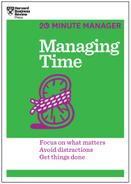Reassess Yourself
Time management isn’t a once-and-done process. Even if you track your time, follow a detailed and smart plan, time box your tasks, and avoid common pitfalls, continue to assess and reassess your progress.
As your priorities shift and your schedule evolves, you’ll need to be both persistent and responsive in order to stay on track. These two characteristics are what separate great time managers from good ones. Great time managers don’t just prepare and then stick to their plans; they are also able to improvise. They learn from their mistakes, and make adjustments.
Are you still on track?
It’s easy to get caught up in the day-to-day hustle of our work lives. We can lose track of our big-picture goals. So it’s important to slow down to make sure our priorities still line up with those objectives.
The best way to do this is to schedule self-checkups. Think of these as you would a trip to the doctor. Is everything working well? Are there warning signs that you should be worried about? Are there things you need to improve?
The frequency of your check-ups will depend on your situation. If you’re juggling multiple projects and deadlines, you may want to assess yourself each week, every few days, or even at the end of each day. If you’re checking off every item on your to-do lists, meeting deadlines, hitting milestones, and finding ample time to work on the projects, tasks, and skills that mean the most to you, then a once-a-month check-in will probably suit you fine.
A check-up gives you a chance to identify warning signs and areas that need improvement before it’s too late, so that you can change your plan or shift your priorities. Even if you’re in good shape, a frequent check-up will, at the very least, give you the peace of mind that your plan is working well.
When checking up, ask yourself these questions:
• Do I feel prepared and focused each day?
• Do I feel like I have enough time to get everything done?
• Am I completing my scheduled tasks?
• Am I making reasonable progress each week?
• Do I frequently work at a comfortable, non-frenzied pace?
• Are my time estimates more accurate than before?
• Am I meeting deadlines?
• Am I achieving my goals?
These questions should get you started. But feel free to add your own to the list. If you have a particular weakness—say, procrastination—it’s a good idea to assess how well you’re improving in that area as well.
Getting back on track
Your answers to the check-up questions will determine your course of action.
• On track. If you answered “yes” to most of the questions, that means you’re on the right track. That’s great! Keep up with what you’re doing, and make adjustments as you see fit.
Even though everything is going well, take the time to write down anything that you learned since your last check-up. If you miscalculated how long a project would take to complete, for example, make a note of it so you don’t make the same mistake twice. Time management is a continual learning process. You may fail sometimes, but as long as you learn something in the process, you’ll make better decisions in the future. This is the time to capture that learning so you can put it into action when the next opportunity arises.
• Off track. If you answered “no” to several of these questions, then you may need to make a few modifications. Some of the changes may be obvious. If you’re not meeting deadlines, you may be able to fix the problem by adding more time to your estimates in the future. But some may take more work to figure out. If you’re not on track to meet your overarching goals, for example, you may have to do some soul searching.
A good place to start is the big-picture vision you created—your priorities, goals, and time allocations. Did you set your goals too high? Are your time allocations off? Did you set your priorities correctly?
If you miscalculated or overlooked something, don’t worry: These things are hard to gauge and will often take some adjusting. When this happens, realistically lower your goals, tweak your time allotments, or rerank your priorities.
If you’re still at a loss, try tracking your time again. You may have missed something the first time, your workload may have increased, or you may have picked up some new bad habits.
Whether you’re on track or off track, the important thing is to keep learning. So make some changes. Strive to get better. Assess and reassess. As long as you prepare, plan, prioritize, and pivot when needed, you will grow into an effective time manager.
